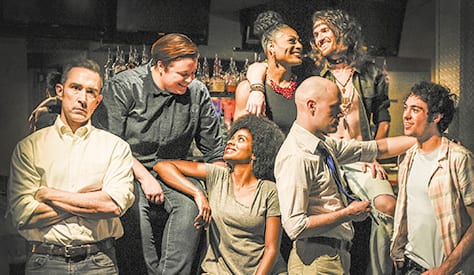WaterTower’s new artistic director chooses as her first production a rollicking history of Stonewall

Joanie Schultz, WaterTower Theatre’s new artistic director, aimed for a diverse and authentic cast for her first show as a director here, the hot-button play-with-music ‘Hit the Wall.’ (Photo courtesy Karen Almond)
ARNOLD WAYNE JONES | Executive Editor
jones@dallasvoice.com
Whenever an arts organization brings in a newcomer to lead it, there’s an expectation that fresh blood equates with fresh ideas … and sometimes radical rethinking. The decision by Addison’s WaterTower Theatre to tap Chicagoan Joanie Schultz to take over for longtime artistic director Terry Martin was a leap of faith for both: Schultz had never led a theater company as AD before, and WTT was looking to expand its footprint in North Texas theater. Sometimes, the new guy — or new woman — dips a toe into the waters gingerly, but Schultz has decided to dive in.
Her first production as a director — a bowshot to signal her lively approach to making theater — was to replace the planned summer musical, Sondheim’s Sunday in the Park with George, with something far more radical: Hit the Wall, a play about the Stonewall Riots that triggered the modern gay rights movement.
Replacing a musical by a beloved icon of American theater with a rarely-performed, politically charged retelling of liberation? It’s not as crazy as it sounds… or at least, Schultz didn’t imagine it would be so.
“When we knew we were going to reprogram the summer show, we went to the [usual suspects]. I was looking for something uplifting and inspiring [to replace Sondheim], something that would attract a young, excited crowd,” she says. She then remembered Hit the Wall, which she first encountered about five years ago in Chicago.
“I knew it would be a good summer show. What struck me when I saw it was the unique storytelling — a hybrid between being a rock concert and a play. It has characters, but it’s the feel for the passion, the spirit underneath it [that captured me],” Schultz says.
She also realized at the time she first saw it how little she actually knew, as a straight woman, about its subject matter.
“I remember not knowing a darned thing about Stonewall,” she admits. “I had heard the words but didn’t really know what happened. I was shocked that a major historical moment in America” was not more widely known. “Stonewall is not being taught in our history classes, though for sure it should be.” It would, she thought, be a good way to start her tenure at WTT.
But the journey has been more uphill than she expected.
“When I picked it, I hadn’t moved to Texas yet,” she says. “It was a huge hit [in Chicago],” so she anticipated an easy sell. “It’s been more challenging for my audience than I anticipated. Some people have said, ‘Haven’t we heard so much about Stonewall?’ But we have a cast full of some younger people who didn’t know much about Stonewall before embarking on this. It has caused a lot of conversation around our theater” — which, Schultz says, is ultimately the role of theater in the life of a society.
It has also plunged her headfirst into the North Texas theater community, which has turned out to be a positive experience for her.
“I had to do the casting very quickly, because I was still not [living full-time in Dallas]. We had 100 actors come out on the first day — 100 truly good actors. And it’s a complicated play in terms of casting, trying for as much authenticity as possible — not just racially, but eight out of the ten roles are queer characters,” and she wanted to reflect that diversity as well.
“This is a really different kind of play to ask people to come in for — I wonder how much some of the actors code-switch to present themselves professionally and not be bitchy, and then I’m asking them for just that,” she laughs.
Assembling the design team presented its own issues. The lighting designer has been a mainstay at WTT, and working with him has shortened her learning curve in dealing with the theater’s unique space. But she took a chance in hiring as her scenic designer a third-year candidate for master of fine arts at SMU to design her first solo show.
“I wanted to give someone new a chance to bring an exciting, younger voice to the stage,” Schultz says. She also hired a trans man to write and perform the music for the show (it’s not a musical but has a rock element that is essential, she explains). Combining new voices with established artists is part of the collaborative process that Schultz enjoys in the craft of theater. And the controversies and hiccups embolden her more than they intimidate. That is, she feels, the very point of the endeavor.
“This is an exciting moment for us to do this play,” she says. “I’ve been really working with the folks here to push our version of Hit the Wall so that we really push it over the wall.”
This article appeared in the Dallas Voice print edition July 21, 2017.


